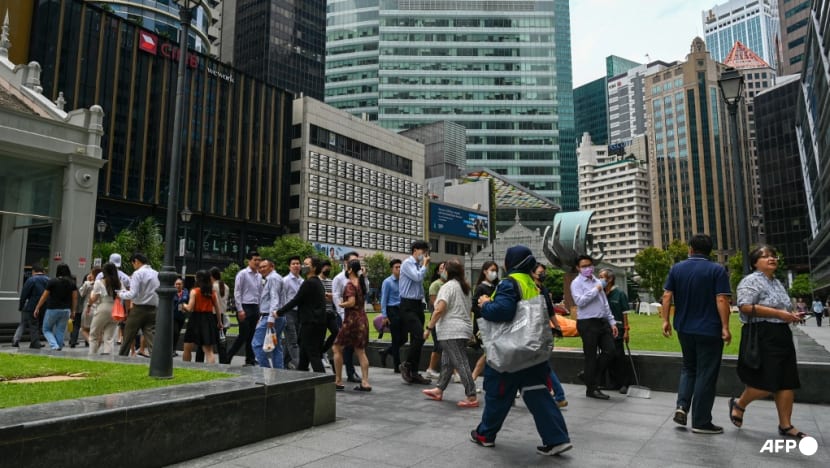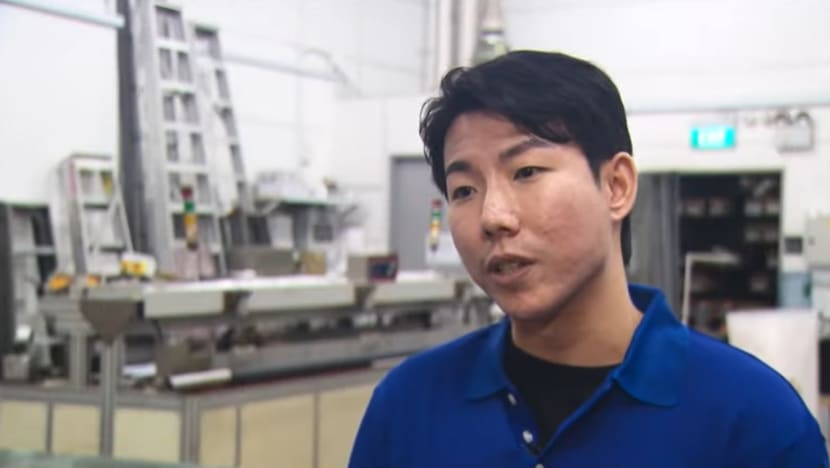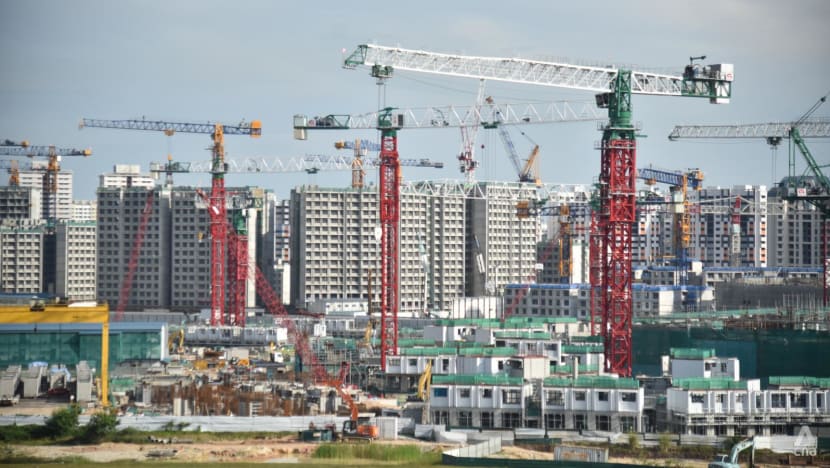Local businesses hope for help in upcoming Budget, as rising manpower costs pose challenges to growth
Just 25 per cent of respondents in the Singapore Business Federation’s (SBF) National Business Survey 2023/2024 were confident the Singapore economy will improve, compared to 41 per cent in last year’s survey.


This audio is generated by an AI tool.
SINGAPORE: Rising manpower cost has been cited as the top challenge for businesses here, based on the latest nationwide survey to capture sentiments from the industry.
To address this, companies are tapping on technology to increase productivity and also relooking their overseas growth strategies, while being aware of risks that may come with such developments.
Findings from the Singapore Business Federation’s (SBF) National Business Survey 2023/2024 were released on Friday (Dec 5). It was conducted from Sep 14 to Nov 12 last year, involving 1,056 companies across all key sectors.
For the upcoming Budget 2024, businesses are hoping for more support in environmental, social, and corporate governance (ESG) transformation, artificial intelligence (AI) technology adoption and in mitigating risks associated with overseas expansion.
The survey found that business sentiment has weakened, with just 25 per cent of respondents confident that Singapore’s economy will improve, compared to 41 per cent in last year’s study.
“It's no longer business as usual for many companies. And as the survey finding has shown, the confidence in the Singapore economy's ability to improve has declined,” SBF CEO Kok Ping Soon told CNA’s Singapore Tonight.
INNOVATION AND PRODUCTIVITY
To overcome the manpower crunch, furniture company Nova Furnishing Holdings uses remotely controlled robots to serve customers.
The firm’s CEO Julian Lim told CNA this means that an employee performing the role of a salesperson does not have to be physically present at one spot at any one time, which increases the number of interactions with customers and hence the firm’s overall sales revenue.
The employees are paid higher salaries as their productivity has now increased, and the company does not need to hire as many people, said Mr Lim.
“For rentals, for freight and the whole logistics end, you can save up to 10 per cent to 15 per cent (on manpower) easily, from our initial estimates. And it could even go up because it's still a learning process,” he said.
Another firm that has transformed its business model to drive growth is Zip Blinds Direct, a blinds manufacturing firm.
Customers can order products online and have the goods delivered and installed in their homes, without having to go through a middleman.

While this fully digital business model has helped the firm cut operating costs, there have been some worries about staying safe in the cyber world.
"Especially right now with the rising (number of) scams and everything, cybersecurity is always a concern, especially for an automated business like us,” general manager Jei Leong told CNA, sharing that data security is a big concern.
He hopes that the upcoming Budget would provide more grants and programmes for firms like his to pursue digital and innovative trends, and build up robust digital infrastructure and cybersecurity.
Finance Minister and Deputy Prime Minister Lawrence Wong will be delivering this year’s Budget speech on Feb 16.
ADJUSTING TO MARKET CONDITIONS
Mr Kok explained that one factor affecting businesses’ preparedness for the challenges ahead is the credit situation.
“We found that eight in 10 companies are being impacted by the interest rate hike last year. Of these eight companies, one in two are facing a slight to severe credit crunch situation,” he said.
“What we are really concerned (about) is that one in 10 are actually running out of cash over the next six months, and that is an increase from 6 per cent (last year).”
However, Mr Kok noted that the circumstances vary across different sectors, with firms in the construction sector, wholesale trade sector and the hotel, retail and accommodation sector more impacted by the credit crunch.
“But having said that, all in all, I think businesses in Singapore are resilient. They are actively taking measures to see what they can do. In response to the increase in interest rates, companies are actively reviewing the variable loan rates,” he said.
He added that to conserve cash, firms are actively trying to slow down some outflows, by minimising non-mandatory expenditures and even delaying investment plans.
Mr Ang Yuit, president of the Association of Small and Medium Enterprises, said that local businesses are hoping that demand will go up as the world exits the pandemic and trade from China rises.
“With costs going up and demand staying stagnant, you're going to have some challenges, so hopefully demand goes up. That may be due to global factors and internally if we can look at how we can stimulate some of this, that would really help,” he said.
DIFFERENCES IN SECTORS
Of the companies in the survey that were confident things will improve, the construction sector, logistics sector and finance and banking sector stood out, noted Mr Kok.
“For the construction sector, notwithstanding some of the cost challenges that they have, construction demand is still pretty strong. Many of these were projects that were delayed because of COVID-19, and of course there’s a rush to complete them,” he said.
While the official figures are not yet in, Mr Kok said 2023 will close out with construction output of between S$25 billion (US$19 billion) to S$32 billion.

A significant portion of this comprises public construction projects, such as Build-to-Order (BTO) projects and MRT projects.
However, the sector also faces its own challenges, such as manpower costs and dormitory costs, added Mr Kok.
For the logistics sector, the rebound in air travel has contributed to optimism, he said. E-commerce has also been a big driver, with the booming digital economy generating many new opportunities.
In the finance and banking sector, fund managers are increasingly seeing flows of funds into Singapore, said Mr Kok.
“There's a certain sense that perhaps with the expectation (that) there will be rate cuts, the United States’ interest rate may stabilise and there will be a bit more demand,” he explained.
OVERSEAS EXPANSION
Furniture firm Nova Furnishing Holdings may be ready to embark on its dreams to go international, but the rising cost of securing funding has put a dent in its growth plans for now.
"It means that it's more expensive when you want to invest, for example, in a fulfilment centre overseas and you get funding from a bank (with) the increased interest rates,” said Mr Lim.
“You better make sure that the amount of money that you save (from manpower costs) is going to be significantly higher than the increment of interest rates.”
Mr Ang said that in light of diminishing demand and rising financial concerns, most small- and medium-size enterprises (SMEs) are considering more carefully the ability and resources that they have, especially when it comes to expanding overseas.
“Naturally, many businesses would be a little more cautious when you talk about new markets and expansion because there is risk involved,” he said.
However, he said that many firms have learnt during the pandemic that with digitalisation and remote working, certain parts of the workflow can be relocated overseas.
Many firms’ strategies moving forward would hence involve identifying possible markets to enter as an offshore opportunity, while keeping and building key manpower and talent in Singapore, said Mr Ang.
Mr Kok urged businesses to tap on the region’s potential and to continue growing overseas.
“Fortune favours the bold. I think it's important to send the message to SMEs that even in this climate, they should continue to explore opportunities overseas,” he said.
He noted that the survey shows that the percentage of local businesses with an overseas presence has increased from 72 per cent to 76 per cent, with Vietnam, Malaysia and Indonesia the popular targets.
Mr Kok said that while Singapore is suffering from a demographic deficit, other countries in Southeast Asia are benefiting from a demographic dividend, and the rates of growth in those markets will be much higher.
“It's important that our SMEs continue to look for these opportunities, look for partners and pre-position themselves, because dark clouds will go away and when they are ready, they will be better able to exploit these opportunities,” he said.
















